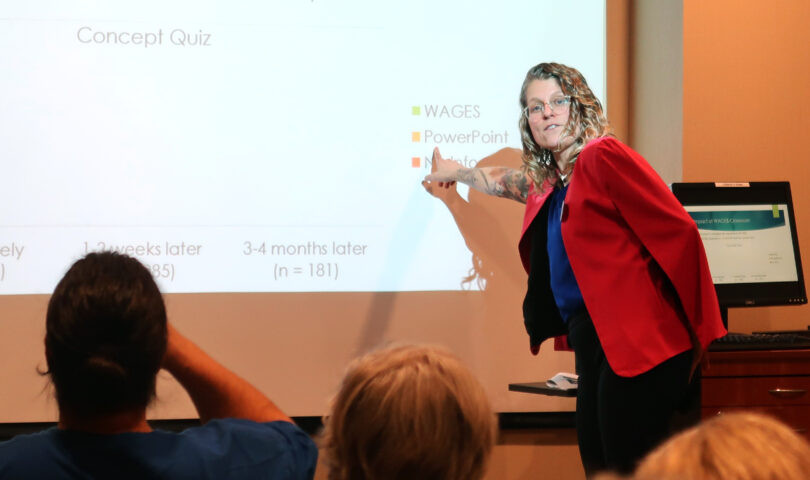Dr. Leah Warner enthusiastically presented to students and faculty on Thursday about how her interdisciplinary scholarship on social justice pedagogy relates to academic freedom. The American Federation of Teachers (AFT) sponsored the discussion as part of their Academic Freedom Talk series.
Warner shared that teachers usually implement social justice pedagogy by mindfully creating an inclusive curriculum, facilitating safe discussions on contentious matters and helping students harness their analytical skills. She said that social justice pedagogy must foremost acknowledge racism and sexism as oppressive systems, which is not widely accepted among K-12 school districts but often embraced at most liberal arts colleges.
Ramapo requires a Social Science Inquiry course to help first-years develop essential skills related to a liberal education, which Warner teaches. The requirement of this course — which dives into social inequalities, power structures, social identities and the search for social justice — and of similar ones at other schools prove that administrations also see significance in understanding the structural features of inequality.
What happens then if academic freedom is compromised? Warner noted that academic freedom is based on the belief that the free exchange of ideas helps educational institutions prosper. The AFT’s website refers to academic freedom as the fundamental concept that “ensures that colleges and universities are ‘safe havens’ for inquiry, places where students and scholars can challenge the conventional wisdom of any field — art, science, politics or others.”
She discussed how many of the bills that have been passed recently across the United States do not only try to hinder academic freedom but entirely demolish it, taking courses similar to Social Science Inquiry down with it. The bill that began this trend was Florida’s SB 266 bill.
SB 266 forbids the spending of federal funds by the Florida College System on programs or on-campus events that advocate for diversity, equity and inclusion, or that involve political or social activism. The bill effectively bans courses that evaluate systemic racism, sexism, oppression and privilege as inherent institutions created to maintain social, political and economic inequities.
“The restrictions of SB 266 makes classes like Social Science Inquiry purposely vague,” Warner said. She pointed at the board where the course description of Social Science Inquiry was displayed with keywords, such as inequality, social justice, racism and more, crossed out.
From June 2021 through June 2023, 22 bills were introduced to restrict academic freedom and 13 provisions became law or policy in nine states, but Warner knows these attacks are not unfightable. She said that with proper assembly, state schools like Ramapo can protect the foundation of academic freedom. She expressed the effectiveness of raising awareness, building coalition and vocalizing support for campus-wide protections for faculty and students.
Through her research, Warner created WAGE$, an evidence-based classroom board game that educates students on gender bias. Her method behind the game was to identify key features of gender bias by using real-life circumstances to create an interactive experience.
The gender equity simulation prompts students to move up the board of career success based on a situation drawn on a card. Three to four months after playing the game, 40% of students were more likely to report gender bias in the workplace than students taught through a PowerPoint or lecture.
Restrictions on academic freedom directly correlate to conditions of social justice pedagogy research. With funding, interactive lessons like WAGE$ are possible, but without funding and support, the teaching of social sciences can take a less authentic form.
Two AFT interns attended the discussion, and at the end, Warner shouted them out for the work they do for the union. Their job is to guide outreach on behalf of the union to the student body. Warner said that students are some of the most influential people who can help ensure a safe campus that expands, not diminishes, knowledge.
klombar5@ramapo.edu
Featured photo by Keely Lombardi






